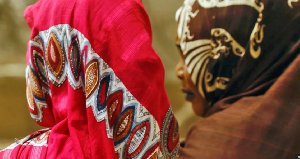It is always precarious to throw out caution in the air and jump in with both
legs; this will amount to crippling one’s self, thereby crawling in to the
future as slave without any defense.
The issues emanating from the fallout between the International Social
Development Centre (ISODEC), the Alliance for Reproductive Health (ARH),
Essential Platform, the International Aid Agency, Oxfam and the National Health
Insurance Scheme (NHIS) is as a result of improper records keeping; perhaps
close communication culture or policy and shrew ding of information. In this era
of thirst for information to feed the public on daily basis, any means, no
matter how foul or fair it comes, admissibly it will go to bed. However, it is
the person in search of the information, who has to be circumspect in the
publication of such materials. But this is purely based on the modesty and
discretion of the fellow in whose possession such information falls.
Nonetheless, record keeping in this dear country of ours is nothing to think
about. We are still using papers to collect and store information and this is
honestly out molded, yet there seem to be no end to this practice. We need to
overhaul this medium through which information can be managed. These will safe
many Ghanaians, the pun of struggling to put out information when the need is
critical.
Additionally, there is the held view that, there is a second independence which
Africa and for that reason Ghana has to fight. This is to the effect that, some
of these in international organisations are always in the mood and spirit of
discrediting efforts of developing countries. In this case, let not the
exaggerative mind get into the business of being steep in the imagination to
think I have sprang to the defense of a governmental institution, the NHIS. But
from the stand point of objective inference, Oxfam of the United Kingdom cannot
be correct to quote the patronage of the National Health Insurance Scheme at 18
per cent. What should be recommended is for Oxfam to make available the
methodology used to arrive at the statistic of 18 per cent. This will enable for
a replication which is one of the cardinal internal characteristics and control
mechanisms of science and research. Again, the size of the sample as well as the
population should be made available, for independent minds and bodies to retest
the procedures to determine the internal validity of the research. For the
reason that, the potency of a test depend to a large extent on the error margin.
This has to do with the sample size as compared to the population that is being
worked with at a time. Irrespective of the report, the interview or the
questionnaire used to collect the information has to also be made available to
determine whether or not it was directional. It’s relevant.
Nonetheless, the NHIS authorities can use this opportunity afforded them to let
in their publics to know what is the true tale of the dust been thrown around,
before their eyes are soured. It will also do a lot of service to the image of
the authority, should they obtain the full text of the Oxfam report and answer
the queries the international organisation came up with. After the thorough
study, the report should be published wide enough to insulate the image of the
scheme. How true is it that the United Kingdom (UK) wants to back out of the
free maternity care offered to Ghanaian mothers? Subjectivity is with emotions
and sentiments, but objectivity has to do with universality, the 18 per cent
being quoted by Oxfam is too abysmal.
An aspect the implementers of the scheme has to pay heed to is the increases on
the premium annually which has the tendency of pushing out of the National
Health Insurance Scheme (NHIS) the many poor households in the country. This is
a cogent issue which needs critical attention, because a higher premium
increases the possibility of turning away many subscribers to the scheme.
Instructively it will be in the best interest of the managers of the scheme to
get hold of the Oxfam Report and study it critically to infer from the document,
because it is an age old belief that, there is something good in everything bad,
and there is something bad in everything good. The Public Relations Department
of the NHIS should intermittently scan the environment to identify and deal with
or curb these image smirking reports. Though issues of this nature can
sometimes be difficult to identify at a stretch, regular scanning would help in
this perspective.
In all intent and purposes, the NHIS should by dint of hard work focus on their
core mandate, while being mindful of possible detractors.
Patrick Twumasi
(0209045931)
patricktwumasi@yahoo.com
Opinions of Friday, 18 March 2011
Columnist: Twumasi, Patrick
Oxfam’s Report On Nhis, A Critical Look.
Entertainment













